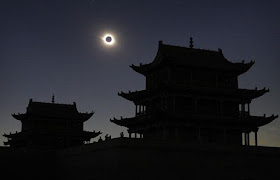Today, the news is grim, but not as dire as it was on 27 May, when a Super-typhoon known as Songda, then a catergory 5 storm, appeared set to hit the Fukushima plant directly. By 28 May the storm was
downgraded to a category 3 and changed its path slightly. As 'Tyler Durden' at
Zero Hedge remarked: "The good news: by the time it passes over Fukushima, Songda will be merely a Tropical storm. The bad news: by the time it passes over Fukushima, Songda will be a Tropical storm. As the latest dispersion projection from
ZAMG shows, over the next two days the I-131 plume will be covering all of the mainland." The fallout will also be blowing over the Koreas, eastern China and eastern Russia at this time. The real danger from Songda (aka Chedeng), aside from the nightmare of coping with three simultaneous meltdowns in a typhoon, is that
radioactive fallout will be carried up into the atmosphere by the storm system.
In addition to the position of the
I-131 plume (we're not even talking about
the presence of plutonium at the site, which isn't being discussed much), there are almost
100,000 tonnes of radioactive water at Fukushima, not including the radioactive water already released into the sea and polluting the immediate vicinity in the Pacific. And while the amount of radiation released is currently
10 per cent of that released at
Chernobyl, a TEPCO official has estimated that Fukushima's radioactive fallout released may eventually exceed that of Chernobyl. There is a constant trickle of problems reported, most recently, a
fire at the neighbouring Dai-ni Fukushima plant (not the one where all the problems are) and
cooling system failure in Reactor #5 at the Dai-ichi plant.
There isn't much on the Web that states how storm systems like typhoons, hurricanes and tornadoes might carry radioactive fallout along with regular wind patterns. Certainly, a
tornado carried fallout at Kyshtym, when it touched down on a radioactive dried lake bed where waste had been dumped, turning the site into a nuclear disaster zone of seriousness equal to
Hiroshima.
You can trace the daily radioactive plume over Fukushima
here. You can follow the daily
Jet Stream projections over North America,
here. Meanwhile, the American Midwest is getting
catastrophically battered by tornadoes, which not only potentially carry Japanese fallout while spreading disaster; they have caused little-reported
damage to American nuclear plants in Alabama as well. When you add the flooding that
damaged other nuclear plants along the Mississippi River, which involved the release of radioactive water into the river system, followed by tornadoes that pick up the water and carry it into the atmosphere
and an unusually high level of North American spring rainfall - well - it's starting to look like a house of cards.
Meanwhile, as if matters in the civilian nuclear sector were not bad enough, nuclear weapons problems are also looming. Even in circles noted for sober assessments, observers commented
this past February that Iran could develop a nuclear weapon within one year and missile capabilities within two years; according to
Mark Fitzpatrick of the International Institute for Strategic Studies in London: "Whichever method were used, at least six more months would be required to convert the gasified HEU into metal and fashion it into a weapon. The minimum timeline, then, for the first weapon, is over two years under the Pakistan method and one year for the batch method. Developing a means to deliver a nuclear weapon adds to the timeline. Last May [2010], in a companion Strategic Dossier on
Iran’s Ballistic Missile Capabilities, the IISS concluded that Iran’s
Sajjil-2 missile, which has a range of about 2,200km, is still two to three years of flight testing away from becoming operational."
But even in the face of horror, we can find something beautiful. Two stories on Fukushima and Chernobyl are reminders of this.
On the day of the Japanese earthquake, the telescope at the Hoshi no Mura ('Village of Stars') Observatory in
Tamura, Fukushima Prefecture, cracked in half; one portion of the telescope, weighing about three tonnes, rolled down and crushed the seat of the astronomer. Fortunately, the director, Hiroaki Ohno, was away at lunch. Despite being only 33 kilometres from the plant and just outside the evacuation zone, Ohno is still attending to the facility. He is also seeking to help local evacuees, and has been travelling to shelters with small telescopes. Taking advantage of the fact that all city lights are turned off in the region, he is teaching them how to look through these telescopes to see the stars. From the
Japan Times: "'A bedridden woman came out of the evacuation shelter once in a wheelchair to take a peek. She told me she could distinguish the rings around Saturn,' Ohno said. The planets and stars appeared to provide much-needed cheer in the evacuees' lives, he added."
The twenty-fifth anniversary of Chernobyl last month also inspired a renewed appreciation of the natural environment in the evacuation zone.
Boing Boing ran a piece on the sounds of birds, animals and insects there at dawn and dusk (-Thanks to
J.). The recordings were made by London sound artist Peter Cusack in 2006; you can listen to them
here.
In addition, a charity album of dark ambient and horror music,
Remember Chernobyl, was composed to commemorate the anniversary. There is an album sampler from Ambientaria Records, below the jump.












